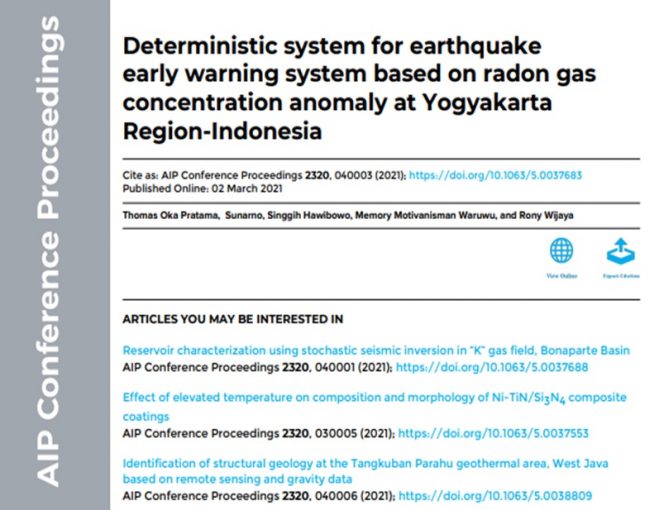
Prof. Ir. Sunarno, M.Eng., Ph.D., IPU. and team in Disaster Mitigation and Data Communication successfully disseminated research at the AIP Conference Proceedings with the title “Deterministic system for earthquake early warning system based on radon gas concentration anomaly at Yogyakarta Region-Indonesia” which is published in 2021.
Earthquakes are one of the most destructive natural disasters on earth, resulting from surging tectonic stress. It is extremely difficult to predict due to a lack of different statistical patterns required to model future occurrences. Indonesian Meteorology, Climatology, and Geophysics Agency (BMKG) said that 11.920 earthquakes happened in 2018 and 11.473 earthquakes in 2019. In 2018, 29 destructive earthquakes and one earthquake were followed by a tsunami that caused 4047 people dead or lost, 6.439 people injured, 704.849 people evacuated, and a thousand public facilities damaged. While in 2019, there were 147 people injured, 5.025 homes damaged, and hundred public facilities damaged caused by 13 destructive earthquakes.
Earthquake prediction is necessary to reduce the risk caused by earthquakes. The purpose of this research is to predict when the earthquake will happen from the instrumentation system based on the telemonitoring of radon concentration anomaly to provide an early warning system alarm before an earthquake occurs.

Figure 1. Diagram block of radon gas concentration monitoring system.
The methodology which is used in this research is built radon concentration monitoring systems placed near the fault around Yogyakarta- Indonesia. Radon concentration is measured every one hour using Radon Eye. Then, the author analyzes the pattern between radon gas concentration and the earthquakes that happen from Sumatra until Nusa Tenggara Timur (NTT) above Magnitude 4.5. The data of earthquakes accident are collected from the Indonesian Meteorology, Climatology, and Geophysics Agency (BMKG) and Postdam Geofon.

Figure (2). Radon gas concentration data. (3) Radon gas concentration measuring tools
The data of earthquakes and radon gas concentration were collected from August 2019 until March 2020. Then, radon gas concentration data sort by daily average. The daily average data are then compared with each other when an earthquake occurs. So, we get the conditions that can be used as earthquake predictions from comparing the daily average concentration of radon gas.
After analyzing the daily average comparison pattern, which is then referred to as the prediction algorithm, it was found that to predict earthquakes, at least 4 out of 5 algorithms were met. With the existing algorithm, there are 34 predictable earthquakes from 51 earthquakes that occur, and there are 34 correct algorithms from 60 earthquake prediction algorithms. Thus, the level of earthquake prediction is 50%, with an accuracy of 64.71% earthquakes occur in the next 1-3 days.
The results of this study are expected to be an initial study in designing an earthquake early warning system based on fluctuations in the concentration of radon gas. However, the earthquake prediction algorithm may be different for other places because each area has different permeability of the soil and rock composition. This study can be developed to design an earthquake early warning system (time, magnitude, location) based on fluctuations in the concentration of radon gas to reduce the risk of an earthquake occurring.
For more Information and collaboration, please contact:
Prof. Ir. Sunarno, M.Eng., Ph.D., IPU
Department of Nuclear Engineering and Engineering Physics, Universitas Gadjah Mada
Jl. Grafika No.2, Sinduadi, Mlati, Sleman, Daerah Istimewa Yogyakarta, 55281
Indonesia
Email: sunarno@ugm.ac.id
Reference:
- O. Pratama, Sunarno, S. Hawibowo, M. M. Waruwu, and R. Wijaya, “Deterministic system for earthquake early warning system based on radon gas concentration anomaly at Yogyakarta Region-Indonesia,” AIP Conference Proceedings 2320, 040003(2001) doi: 10.1063/5.0037683.




Dear Sir, I would be happy to receive a detailed work including results on the radon measurement system in your country. Dr. Hovav Zafrir
The Geological Survey of Israel
Yesha’yahu Leibowitz 32, Jerusalem, 9692100 Israel. Tel: 972-2-5314240, 972-507-878232 (cell.)
hzafrir@gmail.com ,